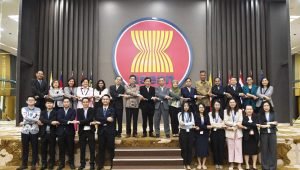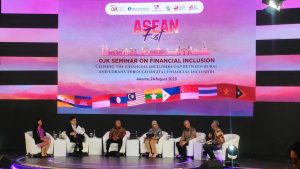The AMF is not alone in carrying out its tasks and desires. The AMF often joins hands with local government associations (LGA) to help strengthen the work of the AMF and its members. LGA is the national voice of local government devoted to supporting, promoting, and improving local government. In ASEAN, several local government associations exist, this includes
Cambodia-National League of Local Council (NLC): The National League of Local Councils (NLC) is the national voice of local government associations that represents Municipal, District, Khan, Commune, and Sangkat Councils throughout Cambodia. NLC seeks to support the interests of its members at the national level and provide local councils with the services they need. But among other things, NLC is particularly vocal to aid its members in their decentralization efforts. To do so, NLC dispenses training and other relevant services on the legal and regulatory framework needed to foster adept local governments.
Indonesian Association of Local Authorities (APEKSI): APEKSI is an organization for all city governments in Indonesia. Established on 25 May 2000, the organization grew out of a need to empower local government functioning in Indonesia. APEKSI helps the city governments to strengthen regional autonomy and provides beneficial arrangements between Indonesian city governments. The association also arms its members with advocacy, capacity-building, and the development of technological innovations. In 2023, APEKSI has 98 members spread across the country.
Malaysia-Malaysia Association of Local Authorities (MALA): Malaysian Association of Local Authorities, or more familiarly known as MALA, was set up on October 20, 2000. MALA members are from the local authorities across Malaysia, namely the City Council, the Municipal Council, District Council or any other authorised body, organisation or those with its function similar to that of a local authority. The main purpose of MALA is to coordinate and unify the various activities of Local Authorities in Malaysia in order to further enhance and contribute to the development and progress of the local authorities, whilst maintaining sustainable development within them.
Philippines-Union of Local Authorities of the Philippines (ULAP): The Union of Local Authorities of the Philippines (ULAP) is the umbrella organization of all leagues of local government units (LGUs) and locally elected government officials, and was formed in 1998, registered in 1999, and further endorsed through Executive Order 35, series of 2004. ULAP was created to convene and represent its member leagues and local governments to national and sub-national policy and program committees in continuous pursuit of strengthening and capacitating LGUs for local autonomy and good governance.
Thailand-National Municipal League of Thailand (NMLT): The National Municipal League of Thailand (NMLT) is the local government association for municipalities in Thailand. The NMLT carries several duties, which among other things, are: (i) to promote cooperation and good relations between municipalities, other forms of local government organizations, and other developmental bodies (i.e., community organizations, private organizations, and state enterprises); (ii) to promote the development of the local political system of municipalities; (iii) to provide research and development, training, workshop, and capacity-building for local municipalities; (iv) to represent municipalities across the country in conducting political activities with the government, parliament, and relevant political organizations at the national level, this includes matters related to the formulation of policies, legislation, and regulations on, but not limited to, local decentralization.
Vietnam-The Association of Cities of Vietnam (ACVN): Headquartered in Hanoi, Vietnam, ACVN was established during the beginning of the country’s modernization and international integration. It is registered as an NGO under the State Management of the Ministry of Home Affairs. Its main goal includes acting and organizing for the best interests of Vietnamese cities and towns primarily via capacity-building.


